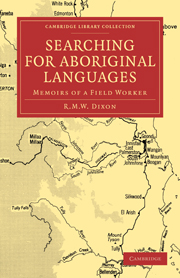Book contents
- Frontmatter
- Contents
- List of Illustrations
- Acknowledgments
- Map
- 1 Setting Off
- 2 “Haven't you got a machine?”
- 3 “You never talk it to me!”
- 4 Full of Unforgettable Characters
- 5 “Time to get back to wife”
- 6 “Drink this!”
- 7 “Of course we'll keep in touch”
- 8 “Doing all these Jalnguy”
- 9 Lots of Linguistic Expertise
- 10 “This way be bit more better”
- 11 “Happiness and fun”
- 12 “It's not”
- 13 “Those are good for you”
- 14 Loss
- 15 “I think I like that language best”
- Afterword
- Pronunciation of Aboriginal Words
- Tribal and Language Names
13 - “Those are good for you”
Published online by Cambridge University Press: 05 December 2011
- Frontmatter
- Contents
- List of Illustrations
- Acknowledgments
- Map
- 1 Setting Off
- 2 “Haven't you got a machine?”
- 3 “You never talk it to me!”
- 4 Full of Unforgettable Characters
- 5 “Time to get back to wife”
- 6 “Drink this!”
- 7 “Of course we'll keep in touch”
- 8 “Doing all these Jalnguy”
- 9 Lots of Linguistic Expertise
- 10 “This way be bit more better”
- 11 “Happiness and fun”
- 12 “It's not”
- 13 “Those are good for you”
- 14 Loss
- 15 “I think I like that language best”
- Afterword
- Pronunciation of Aboriginal Words
- Tribal and Language Names
Summary
While I'd been in America, Ken Hale had imbued me with the importance of training native speakers in the principles of linguistics, so that they could describe their own languages. It is much more satisfactory to have a native speaker analyse a language, than for people like me to do it. And of course this could fulfil an important social role, involving people in their own bilingual educational policies, and providing jobs for them.
In 1971, very soon after arriving in Canberra, I'd tried to interest the Australian National University in a scheme to bring a couple of bright, well-motivated native speakers of Australian languages to the university, to teach them linguistics. A special programme would have to be devised, since scarcely any Aborigines had had the opportunities for secondary schooling. It was a proposal that demanded educational courage, and special funding. Unfortunately, the top brass at the ANU couldn't be persuaded. Our university coat of arms includes a boomerang across the middle of the shield. But the only interpretation I could advance was that (at that time, at least) proposals concerning Aboriginal education just came flying straight back.
Then, in late 1972, a Labor government was elected, for the first time in twenty-three years. It didn't do everything right, by a long way, and it only lasted three years. But it changed the face of Australia, for the Aboriginal people most of all.
- Type
- Chapter
- Information
- Searching for Aboriginal LanguagesMemoirs of a Field Worker, pp. 281 - 306Publisher: Cambridge University PressPrint publication year: 2011First published in: 1983



